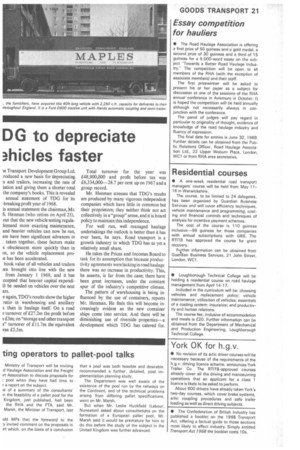DG to depreciate 3hicles faster
Page 23

If you've noticed an error in this article please click here to report it so we can fix it.
le Transport Development Group Ltd. .roduced a new basis for depreciating :s and trailers, increasing the rate of iation and giving them a shorter total the company's books. This is revealed annual statement of TDG for its -breaking profit year of 1968.
is annual statement the chairman, Mr. S. Henman (who retires on April 25), out that the new vehicle testing regulaiemand more exacting maintenance, and heavier vehicles can now be run, ere have been significant advances in taken together, these factors make s obsolescent more quickly than in .st, so the vehicle replacement proLe has been accelerated.
book value of all vehicles and trailers ;en brought into line with the new from January 1 1969, and it has ccepted that heavier capital expendi11 be needed on vehicles over the next ars.
e again, TDG's results show the higher ratio in warehousing and ancillary s than in haulage itself. On a road turnover of £27.2m the profit before s £3m; on "storage and other transport s" turnover of £11.7m the equivalent vas £2.5m. Total turnover for the year was £48,900,000 and profit before tax was £6,334,000-28.7 per cent up on 1967 and a group record.
Mr. Henman stresses that TDG's results are produced by many vigorous independent companies which have little in common but their proprietors; they neither think nor act collectively in a "group" sense, and it is board policy to maintain this independence.
For well run, well managed haulage undertakings the outlook is better than it has ever been, he says. Road transport is a growth industry in which TDG has as yet a relatively small share.
He takes the Prices and Incomes Board to task for its assumption that because productivity agreements were lacking in road haulage there was no increase in productivity. This, he asserts, is far from the case; there have been great increases, under the constant spur of the industry's competitive climate.
The pattern of warehousing is being influenced by the use of containers, reports Mr. Henman. He feels this will become increasingly evident as the new container ships come into service. And there will be diminishing use of riverside properties—a development which TDG has catered for.










































































































